ed形容词与ing形容词的用法区别
- 格式:doc
- 大小:39.00 KB
- 文档页数:3
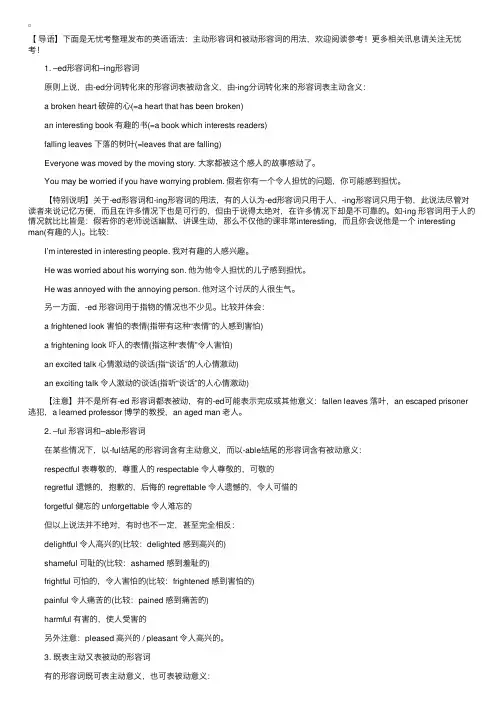
【导语】下⾯是⽆忧考整理发布的英语语法:主动形容词和被动形容词的⽤法,欢迎阅读参考!更多相关讯息请关注⽆忧考! 1. –ed形容词和–ing形容词 原则上说,由-ed分词转化来的形容词表被动含义,由-ing分词转化来的形容词表主动含义: a broken heart 破碎的⼼(=a heart that has been broken) an interesting book 有趣的书(=a book which interests readers) falling leaves 下落的树叶(=leaves that are falling) Everyone was moved by the moving story. ⼤家都被这个感⼈的故事感动了。
You may be worried if you have worrying problem. 假若你有⼀个令⼈担忧的问题,你可能感到担忧。
【特别说明】关于-ed形容词和-ing形容词的⽤法,有的⼈认为-ed形容词只⽤于⼈,-ing形容词只⽤于物,此说法尽管对读者来说记忆⽅便,⽽且在许多情况下也是可⾏的,但由于说得太绝对,在许多情况下却是不可靠的。
如-ing 形容词⽤于⼈的情况就⽐⽐皆是:假若你的⽼师说话幽默、讲课⽣动,那么不仅他的课⾮常interesting,⽽且你会说他是⼀个 interesting man(有趣的⼈)。
⽐较: I’m interested in interesting people. 我对有趣的⼈感兴趣。
He was worried about his worrying son. 他为他令⼈担忧的⼉⼦感到担忧。
He was annoyed with the annoying person. 他对这个讨厌的⼈很⽣⽓。
另⼀⽅⾯,-ed 形容词⽤于指物的情况也不少见。
⽐较并体会: a frightened look 害怕的表情(指带有这种“表情”的⼈感到害怕) a frightening look 吓⼈的表情(指这种“表情”令⼈害怕) an excited talk ⼼情激动的谈话(指“谈话”的⼈⼼情激动) an exciting talk 令⼈激动的谈话(指听“谈话”的⼈⼼情激动) 【注意】并不是所有-ed 形容词都表被动,有的-ed可能表⽰完成或其他意义:fallen leaves 落叶,an escaped prisoner 逃犯,a learned professor 博学的教授,an aged man ⽼⼈。
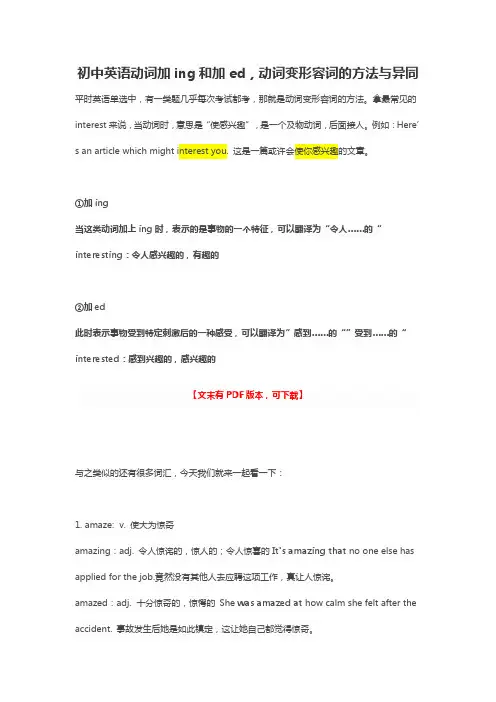
初中英语动词加ing和加ed,动词变形容词的方法与异同平时英语单选中,有一类题几乎每次考试都考,那就是动词变形容词的方法。
拿最常见的interest来说,当动词时,意思是“使感兴趣”,是一个及物动词,后面接人。
例如:Here’s an article which might interest you. 这是一篇或许会使你感兴趣的文章。
①加ing当这类动词加上ing时,表示的是事物的一个特征,可以翻译为“令人……的“interesting:令人感兴趣的,有趣的②加ed此时表示事物受到特定刺激后的一种感受,可以翻译为”感到……的“”受到……的“interested:感到兴趣的,感兴趣的【文末有PDF版本,可下载】与之类似的还有很多词汇,今天我们就来一起看一下:1. amaze: v. 使大为惊奇amazing:adj. 令人惊诧的,惊人的;令人惊喜的It's amazing that no one else has applied for the job.竟然没有其他人去应聘这项工作,真让人惊诧。
amazed:adj. 十分惊奇的,惊愕的She was amazed at how calm she felt after the accident. 事故发生后她是如此镇定,这让她自己都觉得惊奇。
2. annoy:v. 烦扰,打搅,使烦恼annoying:adj. 讨厌的,恼人的It's really annoying when a train is late and there's no explanation. 火车误点而又不作任何解释,这很令人恼火。
annoyed:生气的,烦恼的 I was so annoyed with him for turning up late. 他姗姗来迟,我很生气3. astonish:v. 使吃惊;使惊讶astonishing:adj. 令人惊讶的;惊人的 Her first novel enjoyed an astonishing success. 她的第一部小说取得了惊人的成功。
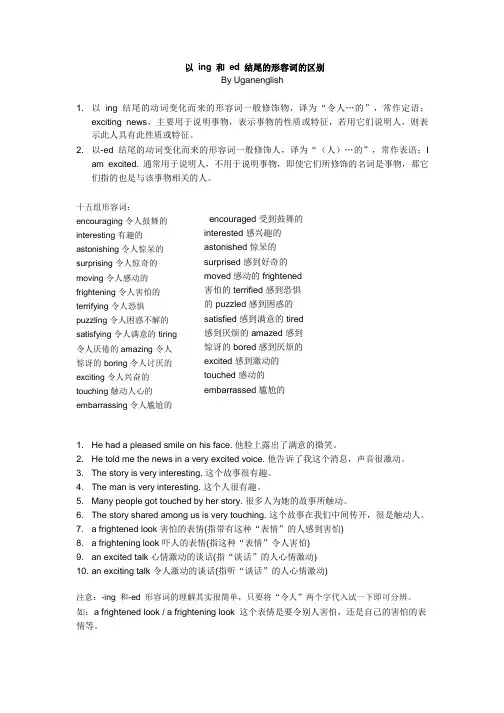
以ing和ed结尾的形容词的区别By Uganenglish1. 以ing结尾的动词变化而来的形容词一般修饰物,译为“令人…的”,常作定语;exciting news,主要用于说明事物,表示事物的性质或特征,若用它们说明人,则表示此人具有此性质或特征。
2. 以-ed结尾的动词变化而来的形容词一般修饰人,译为“(人)…的”,常作表语;Iam excited. 通常用于说明人,不用于说明事物,即使它们所修饰的名词是事物,那它们指的也是与该事物相关的人。
十五组形容词:encouraging 令人鼓舞的interesting 有趣的astonishing 令人惊呆的surprising 令人惊奇的moving 令人感动的frightening 令人害怕的terrifying 令人恐惧puzzling 令人困惑不解的satisfying 令人满意的 tiring 令人厌倦的 amazing 令人惊讶的 boring 令人讨厌的exciting 令人兴奋的touching 触动人心的embarrassing 令人尴尬的encouraged 受到鼓舞的interested 感兴趣的astonished 惊呆的surprised 感到好奇的moved 感动的 frightened 害怕的 terrified 感到恐惧的 puzzled 感到困惑的satisfied 感到满意的 tired 感到厌烦的 amazed 感到惊讶的 bored 感到厌烦的excited 感到激动的touched 感动的embarrassed 尴尬的1. He had a pleased smile on his face. 他脸上露出了满意的微笑。
2. He told me the news in a very excited voice. 他告诉了我这个消息,声音很激动。
3. The story is very interesting. 这个故事很有趣。
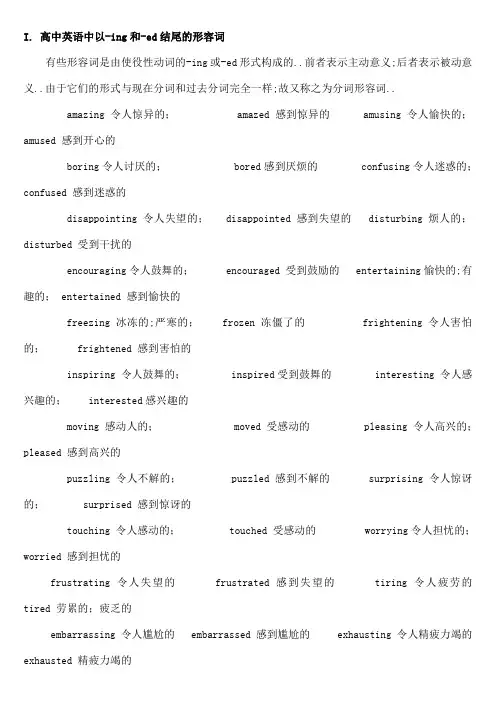
I. 高中英语中以-ing和-ed结尾的形容词有些形容词是由使役性动词的-ing或-ed形式构成的..前者表示主动意义;后者表示被动意义..由于它们的形式与现在分词和过去分词完全一样;故又称之为分词形容词..amazing令人惊异的; amazed 感到惊异的 amusing 令人愉快的;amused 感到开心的boring令人讨厌的; bored感到厌烦的 confusing令人迷惑的;confused 感到迷惑的disappointing令人失望的; disappointed 感到失望的 disturbing烦人的;disturbed 受到干扰的encouraging令人鼓舞的; encouraged 受到鼓励的 entertaining愉快的;有趣的; entertained 感到愉快的freezing 冰冻的;严寒的; frozen 冻僵了的 frightening 令人害怕的; frightened 感到害怕的inspiring 令人鼓舞的; inspired受到鼓舞的 interesting 令人感兴趣的; interested感兴趣的moving 感动人的; moved 受感动的 pleasing 令人高兴的;pleased 感到高兴的puzzling 令人不解的; puzzled 感到不解的 surprising 令人惊讶的; surprised 感到惊讶的touching 令人感动的; touched 受感动的 worrying令人担忧的;worried 感到担忧的frustrating令人失望的 frustrated 感到失望的 tiring令人疲劳的tired 劳累的;疲乏的embarrassing令人尴尬的 embarrassed感到尴尬的 exhausting令人精疲力竭的exhausted 精疲力竭的convincing令人信服的 convinced相信的 fascinating迷人的;有吸引力的 fascinated着迷的thrilling令人紧张的 thrilled紧张的 impressing给人加深印象的impressed被打动的;被留下印象的relaxing轻松的 relaxed放松的;轻松的 annoying令人生气的annoyed生气的II.–ed形容词和–ing形容词的用法区别:原则上说;由-ed分词转化来的形容词表被动含义;由-ing分词转化来的形容词表主动含义:a broken heart 破碎的心=a heart that has been brokenan interesting book 有趣的书=a book which interests readersfalling leaves 下落的树叶=leaves that are fallingEveryone was moved by the moving story. 大家都被这个感人的故事感动了..You may be worried if you have worrying problem. 假若你有一个令人担忧的问题;你可能感到担忧..关于-ed形容词和-ing形容词的用法;有的人认为-ed形容词只用于人;-ing形容词只用于物;此说法尽管对读者来说记忆方便;而且在许多情况下也是可行的;但由于说得太绝对;在许多情况下却是不可靠的..如-ing 形容词用于人的情况就比比皆是:假若你的老师说话幽默、讲课生动;那么不仅他的课非常interesting;而且你会说他是一个 interesting man有趣的人..比较:I’m interested in interesting people. 我对有趣的人感兴趣..He was worried about his worrying son. 他为他令人担忧的儿子感到担忧..He was annoyed with the annoying person. 他对这个讨厌的人很生气..另一方面;-ed 形容词用于指物的情况也不少见..比较并体会:a frightened look 害怕的表情指带有这种“表情”的人感到害怕a frightening look 吓人的表情指这种“表情”令人害怕an excited talk 心情激动的谈话指“谈话”的人心情激动an exciting talk 令人激动的谈话指听“谈话”的人心情激动注并不是所有-ed 形容词都表被动;有的-ed可能表示完成或其他意义:fallen leaves 落叶;falling leaves正在往下落的叶子;an escaped prisoner 逃犯;a learned professor 博学的教授;an aged man 老人; developing country发展中国家 developed country发达国家。
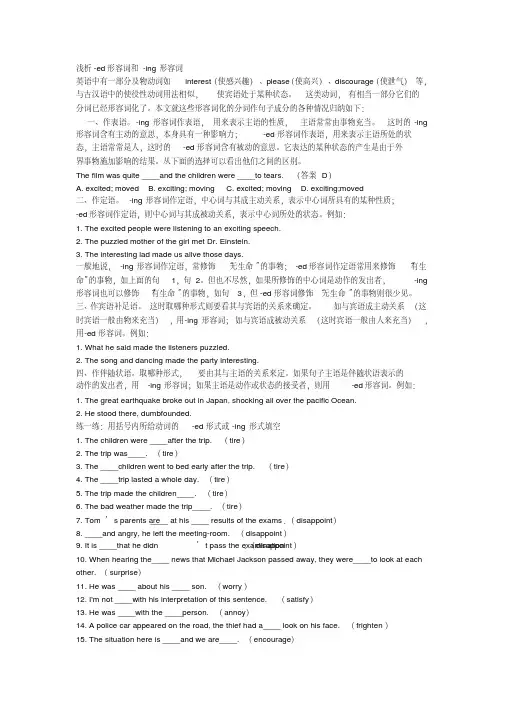
浅析-ed形容词和-ing形容词英语中有一部分及物动词如interest(使感兴趣)、please(使高兴)、discourage(使泄气)等,与古汉语中的使役性动词用法相似,使宾语处于某种状态。
这类动词,有相当一部分它们的分词已经形容词化了。
本文就这些形容词化的分词作句子成分的各种情况归纳如下:一、作表语。
-ing形容词作表语,用来表示主语的性质,主语常常由事物充当。
这时的-ing 形容词含有主动的意思,本身具有一种影响力;-ed形容词作表语,用来表示主语所处的状态,主语常常是人,这时的-ed形容词含有被动的意思。
它表达的某种状态的产生是由于外界事物施加影响的结果。
从下面的选择可以看出他们之间的区别。
The film was quite ____and the children were ____to tears. (答案D)A. excited; movedB. exciting; movingC. excited; movingD. exciting;moved二、作定语。
-ing形容词作定语,中心词与其成主动关系,表示中心词所具有的某种性质;-ed形容词作定语,则中心词与其成被动关系,表示中心词所处的状态。
例如:1. The excited people were listening to an exciting speech.2. The puzzled mother of the girl met Dr. Einstein.3. The interesting lad made us alive those days.一般地说,-ing形容词作定语,常修饰“无生命”的事物;-ed形容词作定语常用来修饰“有生命”的事物,如上面的句1,句2。
但也不尽然,如果所修饰的中心词是动作的发出者,-ing 形容词也可以修饰“有生命”的事物,如句3,但-ed形容词修饰“无生命”的事物则很少见。
三、作宾语补足语。
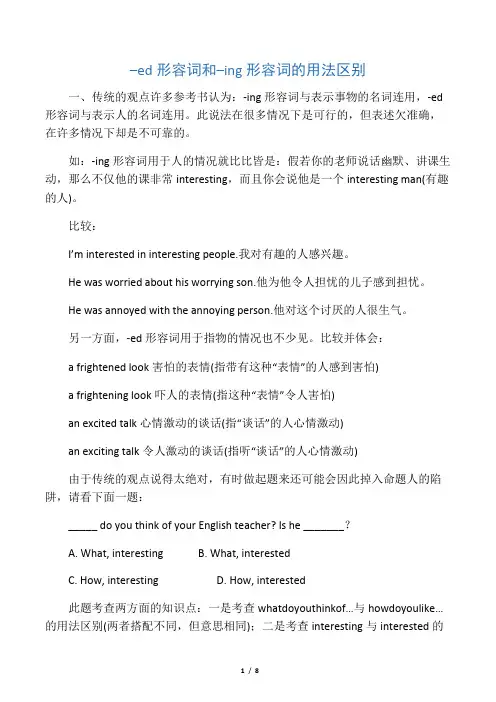
–ed形容词和–ing形容词的用法区别一、传统的观点许多参考书认为:-ing形容词与表示事物的名词连用,-ed 形容词与表示人的名词连用。
此说法在很多情况下是可行的,但表述欠准确,在许多情况下却是不可靠的。
如:-ing形容词用于人的情况就比比皆是:假若你的老师说话幽默、讲课生动,那么不仅他的课非常interesting,而且你会说他是一个interesting man(有趣的人)。
比较:I’m interested in interesting people.我对有趣的人感兴趣。
He was worried about his worrying son.他为他令人担忧的儿子感到担忧。
He was annoyed with the annoying person.他对这个讨厌的人很生气。
另一方面,-ed形容词用于指物的情况也不少见。
比较并体会:a frightened look害怕的表情(指带有这种“表情”的人感到害怕)a frightening look吓人的表情(指这种“表情”令人害怕)an excited talk心情激动的谈话(指“谈话”的人心情激动)an exciting talk令人激动的谈话(指听“谈话”的人心情激动)由于传统的观点说得太绝对,有时做起题来还可能会因此掉入命题人的陷阱,请看下面一题:_____ do you think of your English teacher? Is he _______?A. What, interestingB. What, interestedC. How, interestingD. How, interested此题考查两方面的知识点:一是考查whatdoyouthinkof…与howdoyoulike…的用法区别(两者搭配不同,但意思相同);二是考查interesting与interested的用法区别。
若套用以上关于-ing形容词与-ed形容词的区别,则可能将答案锁定为D。
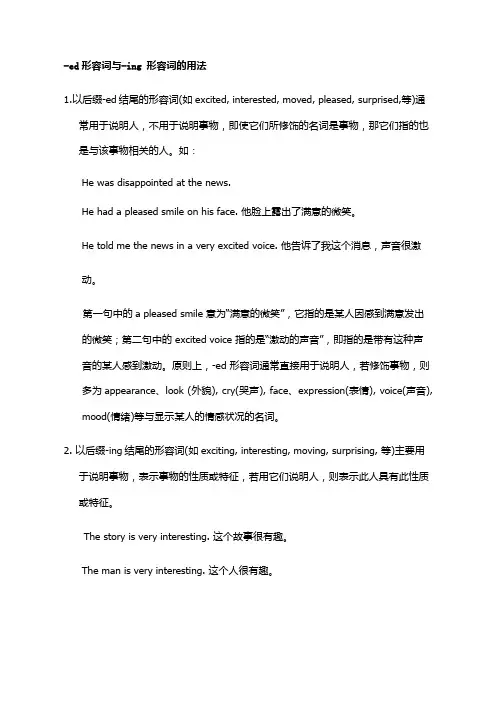
-ed形容词与-ing 形容词的用法
1.以后缀-ed结尾的形容词(如excited, interested, moved, pleased, surprised,等)通
常用于说明人,不用于说明事物,即使它们所修饰的名词是事物,那它们指的也是与该事物相关的人。
如:
He was disappointed at the news.
He had a pleased smile on his face. 他脸上露出了满意的微笑。
He told me the news in a very excited voice. 他告诉了我这个消息,声音很激动。
第一句中的a pleased smile 意为“满意的微笑”,它指的是某人因感到满意发出的微笑;第二句中的 excited voice 指的是“激动的声音”,即指的是带有这种声音的某人感到激动。
原则上,-ed 形容词通常直接用于说明人,若修饰事物,则多为appearance、look (外貌), cry(哭声), face、expression(表情), voice(声音), mood(情绪)等与显示某人的情感状况的名词。
2. 以后缀-ing结尾的形容词(如exciting, interesting, moving, surprising, 等)主要用
于说明事物,表示事物的性质或特征,若用它们说明人,则表示此人具有此性质或特征。
The story is very interesting. 这个故事很有趣。
The man is very interesting. 这个人很有趣。
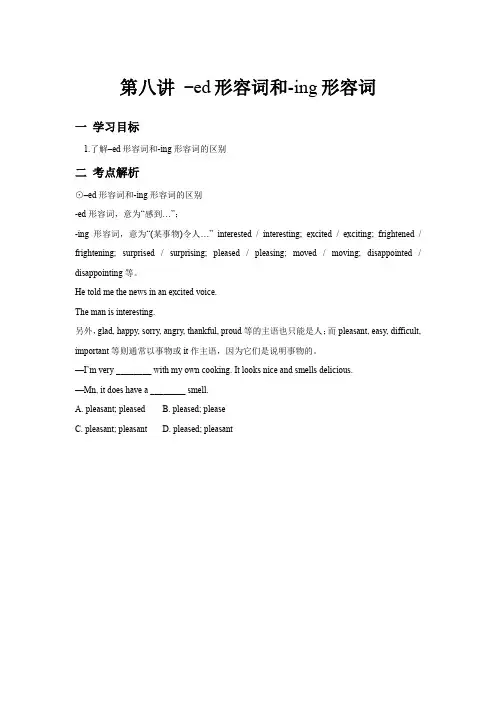
第八讲 -ed形容词和-ing形容词一学习目标1.了解–ed形容词和-ing形容词的区别二考点解析⊙–ed形容词和-ing形容词的区别-ed形容词,意为“感到…”;-ing形容词,意为“(某事物)令人…” interested / interesting; excited / exciting; frightened / frightening; surprised / surprising; pleased / pleasing; moved / moving; disappointed / disappointing等。
He told me the news in an excited voice.The man is interesting.另外,glad, happy, sorry, angry, thankful, proud等的主语也只能是人;而pleasant, easy, difficult, important等则通常以事物或it作主语,因为它们是说明事物的。
—I’m very ________ with my own cooking. It looks nice a nd smells delicious.—Mn, it does have a ________ smell.A. pleasant; pleasedB. pleased; pleaseC. pleasant; pleasantD. pleased; pleasant三练习题一用括内所给动词的-ed形式或-ing形式填空1. The children were ____after the trip. (tire)2. The trip was____. (tire)3. The ____children went to bed early after the trip. (tire)4. The ____trip lasted a whole day. (tire)5. The trip made the children____. (tire)6. The bad weather made the trip____. (tire)7. Tom’s parents are ____ at his ____ results of the exams.(disappoint)8. ____and angry, he left the meeting-room. (disappoint)9. It is ____that he didn’t pass the examination.(disappoint)10. When hearing the____ news that Michael Jackson passed away, they were____to look at each other. (surprise)11. He was ____ about his ____ son. (worry)12. I'm not ____with his interpretation of this sentence. (satisfy)13. He was ____with the ____person. (annoy)14. A police car appeared on the road, the thief had a____ look on his face. (frighten)15. The situation here is ____and we are____. (encourage)二巩固练习:1. The wet weather will continue tomorrow when a cold front ______to arrive.(2008·全国卷I)A. is expectedB. is expectingC. expectsD. will be expected2. —Do you know if Terry will go camping this weekend? (2008·上海高考)—Terry? Never! He _____ tents and fresh air!A. has hatedB. hatedC. will hateD. hates3. By the time he realizes he ____ into a trap, it’ll be too late for him to do anything about it.A. walksB. walkedC. has walkedD. had walked4. So far this year we ______ a fall in house prices by between 5 and 10 percent. (2008·福建高考)A. sawB. seeC. had seenD. have seen5. Some of the people who ________ to the party can’t e no w. (2008·烟台模拟)A. had been invitedB. have been invitedC. are invitedD. invitedws that punish parents for their little children’s actions against the laws get parents _____.A. worriedB. to worriedC. worryingD. worry7. The little boy isn’t getting on well in maths and worse still, he is even unwilling to go to school. With her son _____, she feels very ______.A. disappointing; worryingB. disappointing; worriedC. disappointed; worriedD. disappointed; worrying8. After the Anti-terrorist War, the American soldiers returned home, ______.A. safe but tiredB. safely but tiredC. safe and tiringD. safely and tiring9. As we all know, typing is a ______ job to a ______ heart.A. tired; tiredB. tired; tiringC. tiring; tiredD. tiring; tiring10. Poor boy! His________ looks and ________hands suggested he was very afraid.A. frightful; tremblingB. frightened; tremblingC. frightening; trembledD. frightened; trembly11._____ do you think of your English teacher? Is he _______?A. What, interestingB. What, interestedC. How, interestingD. How, interested参考答案:一1.tired2. tiring3. tired4. tiring5. tired6. tiring7. disappointed, disappointing)8.Disappointed9. disappointing 10. surprising; surprised 11. worried; worrying12. satisfied 13. annoyed; annoying 14. frightened 15. encouraging; encouraged二1-5 ADCDB 6-11ABACBA。
![分词ing型和ed型在英语中的用法及含义[整理版]](https://uimg.taocdn.com/fd59762d86c24028915f804d2b160b4e767f81a5.webp)
分词ing型和ed型在英语中的用法及含义现在分词ing型具有动词的特征以及形容词或副词的功能,可以作表语、定语、状语或在复合结构中作宾补。
现在分词ing型具有主动意义。
而过去分词ed型说明主语情感心理上的感受,往往具有被动的意义。
1、现在分词ing型作表语:表示情感心理的及物动词的现在分词具有主动意义,表示主语的特征,能引起听话人情感心理上的反应。
例如:a. The situation is encouraging. 形势很使人鼓舞。
She is greatly encouraged. 她深受鼓舞。
b. The food smells inviting. 这个才真诱人。
I don’t feel invited to enter such an ugly building. 我没有欲望进这么难看的建筑。
最常这样用的分词有:amazing / amazed,astonishing / astonished,surprising / surprised,encouraging / encouraged,confusing / confused,disappointing / disappointed,exc iting / excited,interesting / interested,puzzling / puzzled,shocking / shocked,worrying / worried,tiring / tired,satisfying / satisfied2、现在分词ing型作定语1)上述表示情感心理的及物动词的现在分词可以作前置定语,仍然表示它所修饰的名词的特征,能引起听话人情感心理上的反应。
它们与对应的过去分词作定语的区别同上。
He told us the disappointing news. 他告诉我们那令人失望的消息。
The amusing story set the amused audience laughed all the time. 令人捧腹的故事令感到好笑的观众大笑不止。

以i n g和e d结尾的形容词Document serial number【NL89WT-NY98YT-NC8CB-NNUUT-NUT108】I.高中英语中以-i n g和-e d结尾的形容词有些形容词是由使役性动词的-ing或-ed形式构成的。
前者表示主动意义,后者表示被动意义。
由于它们的形式与现在分词和过去分词完全一样,故又称之为分词形容词。
amazing令人惊异的;amazed感到惊异的amusing令人愉快的;amused感到开心的boring令人讨厌的;bored感到厌烦的confusing令人迷惑的;confused感到迷惑的disappointing令人失望的;disappointed感到失望的disturbing烦人的;disturbed受到干扰的encouraging令人鼓舞的;encouraged受到鼓励的entertaining愉快的,有趣的;entertained感到愉快的freezing冰冻的,严寒的;frozen冻僵了的frightening令人害怕的;frightened感到害怕的inspiring令人鼓舞的;inspired受到鼓舞的interesting令人感兴趣的;interested感兴趣的moving感动人的;moved受感动的pleasing令人高兴的;pleased感到高兴的puzzling令人不解的;puzzled感到不解的surprising令人惊讶的;surprised感到惊讶的touching令人感动的;touched受感动的worrying令人担忧的;worried感到担忧的frustrating令人失望的frustrated感到失望的tiring令人疲劳的tired劳累的;疲乏的embarrassing令人尴尬的embarrassed感到尴尬的exhausting令人精疲力竭的exhausted精疲力竭的convincing令人信服的convinced相信的fascinating迷人的;有吸引力的fascinated着迷的thrilling令人紧张的thrilled紧张的impressing给人加深印象的impressed被打动的;被留下印象的relaxing轻松的relaxed放松的;轻松的annoying令人生气的annoyed生气的II.–ed形容词和–ing形容词的用法区别:原则上说,由-ed分词转化来的形容词表被动含义,由-ing分词转化来的形容词表主动含义:abrokenheart破碎的心(=aheartthathasbeenbroken) aninterestingbook有趣的书(=abookwhichinterestsreaders)fallingleaves下落的树叶(=leavesthatarefalling)Everyonewasmovedbythemovingstory.大家都被这个感人的故事感动了。

“我很无聊”不是I'm boring,以-ing和-ed结尾的形容词的区别英语中有一些及物动词,它们既可以加-ing构成形容词,也可以加上-ed构成形容词。
这类动词有一个特点,那就是它们的意思都含有“使……”的意思,如“使惊奇”、“使感动”、“使害怕”等等。
I’m boring.(×)“我真的很无聊”与“你真的很无聊”要用不同的形容词,你知道吗?加上-ing构成的形容词意思是“令人…的”,如surprising(令人惊奇的);加上-ed 构成的形容词意思是“感觉到…的”,如surprised(感到惊奇的)。
这类词很多,其中,最常见的包括以下这些:1. interest使……感兴趣:interesting有趣的(令人感兴趣的);interested 感兴趣的2. astonish使惊讶:astonishing令人惊讶的;astonished感到惊讶的3. surprise使惊奇:surprising 令人惊奇的;surprised感到惊奇的4. move使感动:moving 令人感动的;moved 感动的5. frighten使害怕:frightening令人害怕的;frightened感到害怕的6. terrify使害怕:terrifying令人恐惧的;terrified感到恐惧的7. puzzle使……困惑: puzzling 令人困解的;puzzled感到困惑的8. satisfy使……满意:satisfying令人满意的;satisfied感到满意的9. tire使……疲倦:tiring 令人厌倦的;tired感到厌烦的10. amaze使吃惊:amazing令人惊讶的;amazed感到惊讶的11. bore使厌烦:boring 令人讨厌的;bored感到厌烦的12. excite使兴奋:exciting令人兴奋的;excited感到兴奋的13. touch使感动:touching 令人感动的;touched感动的14. embarrass使尴尬:embarrassing令人尴尬的;embarrassed感到尴尬的15. encourage鼓励:encourage令人鼓舞的;encouraged 感到鼓舞的。
ing和ed结尾的形容词用法
以后缀-ed结尾的形容词,如ashamed, delighted等,一般用来形容人的感受,表示“感到......的”,作表语。
以后缀-ing结尾的形容词,如delighting, exciting, frightening 等,一般用来形容事或物本身具有的性质,表示“令人......的”,作表语或定语。
扩展资料
常见的v.-ing,v.-ed词及短语总结如下:
exciting令人兴奋的 excited感到激动的 be excited about对......感到激动
surprising 令人惊奇的surprised感到好奇的be surprised at 对......感到惊奇
amazing令人惊讶的 amazed感到惊讶的 be amazed at对......感到惊讶
tiring 令人厌倦的. tired感到厌烦的 be tired of对......感到厌烦
annoying令人生气的' annoied感到生气的beannoied with 生......的气
worrying令人担心的worried感到担心的be worried about 为......担心。
以ed和ing结尾的形容词汇总以ed和ing结尾的形容词:1. amazing adj. 令人惊异的;惊人的amazed adj. 感到惊奇的;惊讶的2. amusing adj. 引人发笑的;有趣的amused adj. 被逗笑的;愉快的3. astonishing adj. 使人吃惊的astonished adj. 惊讶的;吃惊的扩展资料以-ing和-ed结尾形容词的区别用法:1. 以后缀-ed结尾的形容词,如ashamed, delighted, excited, frightened, interested, moved, pleased, surprised, worried等,一般用来形容人的感受,表示“感到......的”,作表语。
如:He had a pleased smile on his face. 他脸上露出了满意的微笑。
He told me the news in a very excited voice. 他告诉了我这个消息,声音很激动。
第一句中的a pleased smile 意为“满意的微笑”,它指的是某人因感到满意发出的微笑;第二句中的 excited voice 指的是“激动的声音”,即指的是带有这种声音的某人感到激动。
原则上,-ed 形容词通常直接用于说明人,若修饰事物,则多为air(神态), appearance(外貌), cry(哭声), face(表情), voice(声音), mood(情绪)等与显示某人的情感状况的名词。
2. 以后缀-ing结尾的形容词,如delighting, exciting, frightening, interesting, moving, surprising, worrying 等,一般用来形容事或物本身具有的性质,表示“令人......的”,作表语或定语。
如:The story is very interesting. 这个故事很有趣。
–ed形容词和–ing形容词的用法区别一、传统的观点许多参考书认为:-ing形容词与表示事物的名词连用,-ed形容词与表示人的名词连用。
此说法在很多情况下是可行的,但表述欠准确,在许多情况下却是不可靠的。
如-ing 形容词用于人的情况就比比皆是:假若你的老师说话幽默、讲课生动,那么不仅他的课非常interesting,而且你会说他是一个interesting man(有趣的人)。
比较:I’m interested in interesting people. 我对有趣的人感兴趣。
He was worried about his worrying son. 他为他令人担忧的儿子感到担忧。
He was annoyed with the annoying person. 他对这个讨厌的人很生气。
另一方面,-ed 形容词用于指物的情况也不少见。
比较并体会: a frightened look 害怕的表情(指带有这种―表情‖的人感到害怕)a frightening look 吓人的表情(指这种―表情‖令人害怕)an excited talk 心情激动的谈话(指―谈话‖的人心情激动)an exciting talk 令人激动的谈话(指听―谈话‖的人心情激动)由于传统的观点说得太绝对,有时做起题来还可能会因此掉入命题人的陷阱,请看下面一题:_____ do you think of your English teacher? Is he _______?A. What, interestingB. What, interestedC. How, interestingD. How, interested此题考查两方面的知识点:一是考查what do you think of…与how do you like…的用法区别(两者搭配不同,但意思相同);二是考查interesting与interested的用法区别。
若套用以上关于-ing形容词与-ed形容词的区别,则可能将答案锁定为D。
但是错了,此题的最佳答案应是A。
二、正确的观点关于-ing形容词与-ed形容词的区别,比较准确的表述应该是:1.以后缀–ed结尾的形容词(如ashamed, delighted, excited, frightened, interested, moved, pleased, surprised, worried等)通常用于说明人,不用于说明事物,即使它们所修饰的名词是事物,那它们指的也是与该事物相关的人。
如:He had a pleased smile on his face. 他脸上露出了满意的微笑。
He told me the news in a very excited voice. 他声音很激动地告诉了我这个消息。
第一句中的a pleased smile 意为―满意的微笑‖,它指的是某人因感到满意发出的微笑;第二句中的a very excited voice 指的是―很激动的声音‖,即指的是某人因很激动而发生那样的声音。
原则上,-ed 形容词通常直接用于说明人,若修饰事物,则多为air(神态), appearance(外貌), cry(哭声), face(表情), voice(声音), mood(情绪)<'Times New Roman'">), mood(等显示某人的情感状况的名词。
2. 以后缀-ing 结尾的形容词(如delighting, exciting, frightening, interesting, moving, surprising, worrying 等)主要用于说明事物,表示事物的性质或特征,若用它们说明人,则表示此人具有此性质或特征。
如:The story is very interesting. 这个故事很有趣。
The man is very interesting. 这个人很有趣。
请再比较并体会以下句子:He is frightened. 他很害怕。
He is frightening. 他很吓人。
He has a frightened look on his face. 他脸上带有惊恐的神情。
He has a frightening look on his face. 他脸上带有吓人的神情。
I read an interested expression on his face. 我看到他脸上露出一种感兴趣的表情。
I read an interesting expression on his face. 我看到他脸上露出一种有趣的表情。
三、学练结合请做做以下试题,看你是否能克服原来的思维定势,能否跳出命题人的陷阱:1. Laws that punish parents for their little children’s actions against the laws get parents _____.A. worriedB. to worriedC. worryingD. worry2.The little boy isn’t getting on well in maths and worse still, he is even unwilling to go to school. With her son _____, she feels very ______. A. disappointing;worryingB. disappointing;worriedC. disappointed;worriedD. disappointed;worrying3. After the Anti-terrorist War, the American soldiers returned home, ______.A. safe but tiredB. safely but tiredC. safe and tiringD. safely and tiring4. As we all know, typing is a ______ job to a ______ heart.A. tired; tiredB. tired; tiringC. tiring; tiredD. tiring; tiring5. Poor boy! His________ looks and ________hands suggested he was very afraidA. frightful; tremblingB. frightened; tremblingC. frightening; trembledD. frightened; trembly答案与解析:1. 选A。
句中的that punish…the law是定语从句。
句意是:因为他们小孩的违法行为而惩罚其父母,这样的法律使得做父母的感到忧虑。
表示人―感到忧虑的‖用由过去分词转换而来的形容词。
2. 选B。
句意是:由于她的儿子令人失望,她感到非常烦恼。
表示―令人……的‖用-ing 形容词;表示―感到……的‖用-ed形容词。
3. 选A。
此题一方面考查形容词作状语(。
此题一方面考查形容词作状语(当形容词用作状语时,表示意义上的增补,和句子主语在逻辑上有主谓关系),另一方面考查形容词tiring与tired的用法区别,此处填tired表示―人感到疲惫的‖,即选A。
4. 选C。
第一空填tiring,表示―使人劳累的‖;第二空填tired,表示―感到劳累的‖。
5. 选B。
第一空填frightened,其意为―感到害怕的‖;第二空填trembling表示动作的进行。
也就是说,frightened说明主语因……而产生的情绪反应,从而影响到人的身体部位……trembling。
ed形式及常见短语与ing形式形容词归纳excited (be ~d about) / excitingsurprised (be ~d at) //surprisingamazed (be ~d at) //amazingembarrassed(be ~ed in) //embarrassingencouraged(be ~ed at / by) / encouragingfrustrated (be ~d of) / frustratinginterested (be ~ed in) / interestingthrilled (be ~ed at) / thrillingterrified (be terrified at/ of / with) / terrifyingpleased (be ~d with) / pleasing, = pleasantsatisfied(be satisfied with) / satisfyingfrightened (be ~ed at / of ) / frighteningtired (be ~d of) / tiringbored (be ~d with) / boringrelaxed (无固定搭配) / relaxingfascinated (be ~d by) / fascinatingannoyed (be ~ed with) / annoyingmoved (be ~d by) / movingworried (be worried about) / worryingconfused (be confused about) / confusing练习:一用括号内所给动词的-ed形式或-ing形式填空1.The children were ____after the trip. (tire)2.The trip was____. (tire)3.The ____children went to bed early after the trip. (tire)4.The ____trip lasted a whole day. (tire)5.The trip made the children____. (tire)6.The bad weather made the trip____. (tire)7.Tom’s parents are ____ at his ____ results of the exams.(disappoint)8.____and angry, he left the meeting-room. (disappoint)9.It is ____that he didn’t pass the examination.(disappoint)10.When hearing the____ news that Michael Jackson passed away, they were____to look at each other. (surprise)11.He was ____ about his ____ son. (worry)12.I'm not ____with his interpretation of this sentence. (satisfy)13.He was ____with the ____person. (annoy)14.A police car appeared on the road, the thief had a____ look on his face. (frighten)15.The situation here is ____and we are____. (encourage)答案:1.tired2. tiring3. tired4. tiring5. tired6. tiring7. disappointed, disappointing)8. Disappointed9. disappointing 10. surprising; surprised 11. worried; worrying 12. satisfied 13. annoyed; annoying 14. frightened 15. encouraging; encouraged二巩固练习:1.The wet weather will continue tomorrow when a cold front ______to arrive.(2008·全国卷I)A.is expectedB. is expectingC. expectsD. will be expected2.—Do you know if Terry will go camping this weekend? (2008·上海高考)—Terry? Never! He _____ tents and fresh air!A.has hatedB. hatedC. will hateD. hates3.By the time he realizes he ____ into a trap, it’ll be too late for him to do anything about it. (2008·山东高考)A.walksB. walkedC. has walkedD. had walked4.So far this year we ______ a fall in house prices by between and 10 percent. (2008·福建高考)A.sawB. seeC. had seenD. have seen5.Some of the people who ________ to the party can’t come now. (2008·烟台模拟)A.had been invitedB. have been invitedC. are invitedD. invitedws that punish parents for their little children’s actions against the laws get parents _____.A.worriedB. to worriedC. worryingD. worry7.The little boy isn’t getting on well in maths and worse still, he is even unwilling to go to school. With her son _____, she feels very ______.A.disappointing; worryingB. disappointing; worriedC. disappointed; worriedD. disappointed; worrying 8. After the Anti-terrorist War, the American soldiers returned home, ______.A.safe but tiredB. safely but tiredC. safe and tiringD. safely and tiring9.As we all know, typing is a ______ job to a ______ heart.A.tired; tiredB. tired; tiringC. tiring; tiredD. tiring; tiring10.Poor boy! His________ looks and ________hands suggested he was very afraid.A.frightful; tremblingB. frightened; tremblingC. frightening; trembledD. frightened; trembly11._____ do you think of your English teacher? Is he _______?A.What, interestingB. What, interestedC. How, interestingD. How, interested答案:1-5 ADCDB 6-11ABACBA。